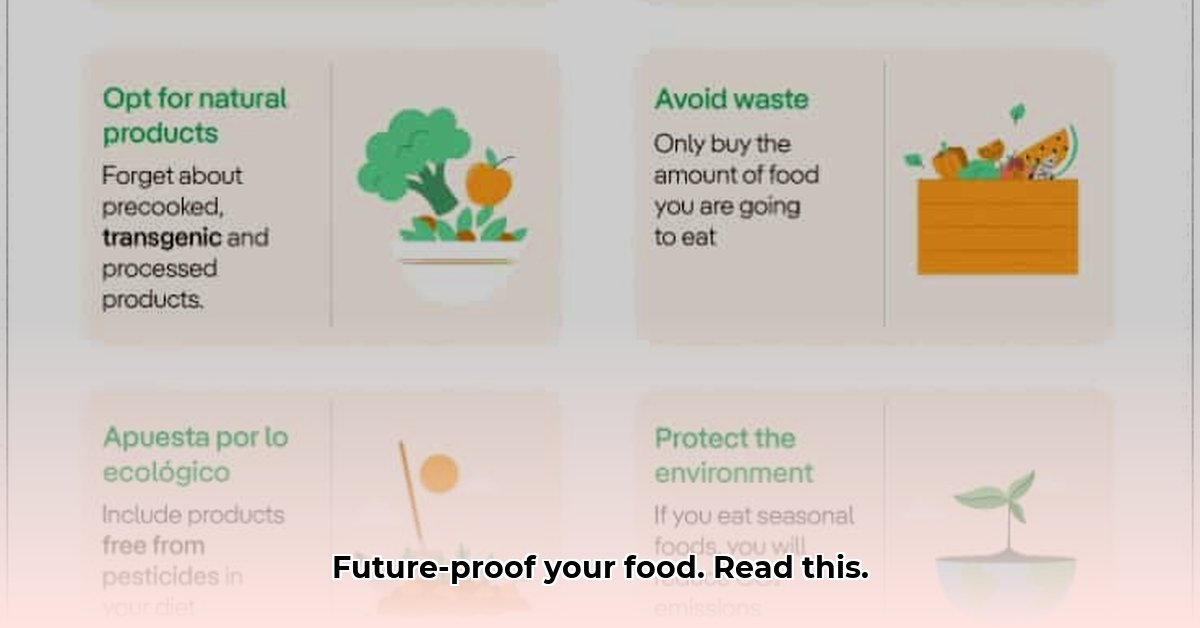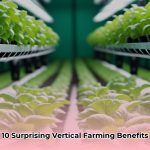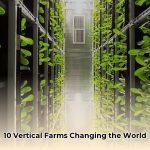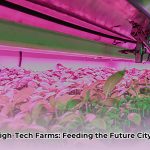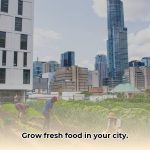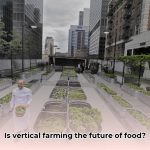Our food system faces a monumental challenge: feeding a growing global population while mitigating its environmental impact. This guide offers practical solutions for a more resilient and sustainable food future, from minimizing kitchen waste to transforming agricultural practices.
Rescuing Food
Roughly one-third of all food produced globally goes uneaten, squandering resources and contributing to greenhouse gas emissions. This waste has environmental, economic, and social implications. Fortunately, reducing food waste is something everyone can contribute to.
At Home
- Plan your meals: Create shopping lists and avoid impulse buys.
- Store food properly: Learn the best ways to keep produce fresh and prevent spoilage.
- Embrace “ugly” produce: Don’t let cosmetic imperfections deter you from perfectly good food.
- Compost food scraps: Divert organic waste from landfills and create nutrient-rich soil.
Restaurants & Grocers
- Offer smaller portions: Cater to varying appetites and minimize plate waste.
- Donate surplus food: Partner with charities to distribute excess food to those in need.
- Improve inventory management: Implement systems to track and manage food stock efficiently.
- Dynamic pricing: Offer discounts on dishes made with ingredients nearing their expiration date.
Dietary Shifts
Reducing meat consumption, even slightly, can significantly lessen our environmental impact. Livestock production requires vast resources and contributes substantially to greenhouse gas emissions. A more plant-forward diet benefits both the planet and our health.
Farming for the Future
Sustainable agriculture involves practices that work with nature to build healthy soil, conserve water, and minimize chemical use.
Key Practices
- Crop rotation: Alternating crops in a field helps prevent soil depletion and reduce the need for synthetic fertilizers.
- Cover cropping: Planting crops specifically to improve soil health enhances fertility and prevents erosion.
- No-till farming: Minimizing soil disturbance helps sequester carbon and mitigate climate change.
Innovative Techniques
- Hydroponics: Growing plants in nutrient-rich water solutions.
- Vertical farming: Stacking crops vertically in controlled environments, ideal for urban areas and regions with limited resources.
Sustainable Seafood
Overfishing threatens marine ecosystems. Sustainable fishing practices, based on scientific data and careful management, are crucial for healthy fish populations.
Streamlining the Food Journey
The journey from farm to table can be long and complex, adding to the environmental cost of our food. Shortening this journey offers significant benefits.
Localizing Food Systems
- Support local farmers: Visit farmers’ markets and join community-supported agriculture (CSA) programs. Buying locally reduces transportation emissions, supports local economies, and often offers fresher, more flavorful produce.
Improving Storage & Transportation
- Eco-friendly refrigeration: Reduce energy consumption and emissions from cooling systems.
- Improved packaging: Extend shelf life and minimize waste.
Strengthening Supply Chains
Diversifying food sources and relying less on long, complex supply chains enhances food security, particularly during disruptions.
Tech-Powered Food Solutions
Technology can play a vital role in creating a more sustainable food system.
Current Innovations
- Microbial stickers: Extend the shelf life of produce and reduce spoilage.
- On-site food waste composters: Transform kitchen scraps into nutrient-rich soil.
Future Possibilities
- Cellular agriculture: Growing meat in a lab without raising animals.
- AI-powered systems: Optimize crop yields, predict weather patterns, and minimize waste throughout the supply chain.
Systemic Change for a Just Food Future
Individual actions are essential, but systemic change is crucial for truly sustainable food solutions.
Food Justice
Everyone deserves access to affordable, nutritious, and culturally appropriate food. Addressing food insecurity, particularly in vulnerable communities, is paramount.
Indigenous Knowledge
Traditional farming practices often emphasize biodiversity, soil health, and water conservation, offering valuable insights for sustainable agriculture.
Blockchain Technology
Blockchain can create more transparent and traceable supply chains, empowering consumers to make informed choices.
Building Resilient Food Systems
Investing in sustainable agriculture and strengthening local food systems in developing countries enhances global food security.
Building a Sustainable Food Future: A Collective Effort
Creating a sustainable food system requires collective action. Support local organizations working on food justice and sustainable agriculture, choose businesses committed to ethical practices, and advocate for policies that promote a healthier food system. Every action, no matter how small, contributes to a more resilient and equitable food future.
The Future of Food: Navigating Challenges and Opportunities
Feeding a projected 10 billion people by 2050 while minimizing environmental impact presents significant challenges and exciting opportunities. Bridging the gap between current food production and future needs requires innovative solutions across demand, production, and environmental protection.
Reducing Demand
- Minimize food waste: From farm to fork, reducing waste is a critical step. Strategies include improved storage, creative use of leftovers, and consumer education.
- Dietary shifts: Reducing meat consumption and embracing plant-forward diets can significantly lessen our environmental footprint. Research suggests that even small dietary changes can have a substantial impact.
Boosting Production Sustainably
- Innovative farming techniques: Vertical farming and precision agriculture offer potential for increasing yields while minimizing land use. Studies suggest that sustainable intensification methods could significantly boost food production.
- Improving efficiency: Optimizing livestock management, developing drought-resistant crops, and using resources more efficiently are essential strategies.
Protecting Our Planet
- Ecosystem restoration: Protecting and restoring forests, wetlands, and other vital ecosystems is crucial for long-term food security. Ongoing research explores the complex relationship between ecosystems and food production.
- Sustainable seafood: Sustainable aquaculture and responsible fisheries management are vital for meeting the growing demand for seafood. Debate continues regarding the most effective approaches, and research is ongoing.
Minimizing Emissions
- Climate-smart agriculture: Practices like improved manure management and regenerative agriculture can reduce greenhouse gas emissions from agriculture. Some experts believe that these practices can also enhance soil health and carbon sequestration.
Addressing Uncertainty
It’s important to acknowledge the uncertainties inherent in predicting the future of food. Ongoing research is constantly evolving our understanding of sustainable food systems. New technologies and approaches may emerge, and current solutions may be refined or replaced as our knowledge expands. By embracing a cautious approach and acknowledging the limits of current knowledge, we can better navigate the complexities of creating a sustainable food future.
Why Sustainable Food Production Matters
Sustainable food production is crucial for long-term food security, environmental protection, and a fairer food system. It encompasses environmentally friendly farming, equitable access to nutritious food, and minimizing food waste. Each aspect plays a vital role in creating a system that works for everyone, now and for generations to come.
Reducing Waste: A Multifaceted Approach
Food waste represents a massive loss of resources. Reducing waste through meal planning, proper storage, composting, and industry initiatives can conserve resources, minimize greenhouse gas emissions, and address food insecurity.
Farming with Nature: A Kinder Approach
Sustainable agriculture prioritizes soil health, water conservation, and biodiversity. Practices like crop rotation and cover cropping enhance soil fertility, reduce pollution, and promote a healthier ecosystem.
Supporting Local: Shortening the Food Journey
Local food systems reduce transportation emissions, support local economies, and often offer fresher, more flavorful produce. Connecting with local farmers fosters a greater understanding of where our food comes from.
Embracing Innovation
Technological advancements, from vertical farming to blockchain traceability, offer exciting opportunities for enhancing food production efficiency and sustainability. Integrating indigenous knowledge and traditional farming practices can further enrich our understanding of sustainable land management.
Food Justice: Ensuring Equity
A truly sustainable food system addresses food injustice and ensures everyone has access to healthy, affordable food, regardless of their background or location. Empowering marginalized communities is essential for achieving food equity.
Individual Action: Every Bite Counts
We all have a role to play in building a sustainable food future. By making conscious choices about the food we buy, eat, and dispose of, we contribute to a more resilient and equitable food system. Small changes can collectively make a significant difference.
Innovative Strategies for Sustainable Food Consumption
Making sustainable food choices doesn’t require drastic overnight changes. Gradual shifts towards more mindful consumption patterns can have a profound impact.
Plant-Based Power: Eating for the Planet
Incorporating more plant-based meals into our diets can significantly reduce our environmental footprint. Livestock production is resource-intensive and contributes to greenhouse gas emissions. Shifting towards plant-based proteins offers a more sustainable alternative.
Rescuing Food: Saving Resources
Reducing food waste at home, in restaurants, and across the supply chain is essential. Simple actions like meal planning, proper storage, and composting can make a big difference.
Farming for the Future: Nurturing the Soil
Sustainable agriculture prioritizes soil health, a vital foundation for a thriving food system. Practices like crop rotation and cover cropping enhance soil fertility, reduce erosion, and minimize the need for synthetic inputs.
Tech-Savvy Solutions: Innovation at the Farm
Technological advancements, including vertical farming, gene editing, and AI-powered farm management, offer exciting possibilities for optimizing food production efficiency and sustainability.
Alternative Proteins: Expanding Our Options
Exploring alternative protein sources like insects and lab-grown meat can reduce our reliance on traditional animal agriculture, which has a substantial environmental impact. While consumer acceptance may present a challenge, these alternatives hold promise for a more sustainable food future.
Ongoing Research and Uncertainties
It’s crucial to recognize that the field of sustainable food systems is constantly evolving. Ongoing research continues to refine our understanding of best practices, and new technologies and approaches are constantly emerging. While there are uncertainties, embracing innovation and continuous learning are key to creating a truly sustainable food future.
- Sustainable Food Solutions: A Practical Guide to Building a More Resilient Food System - January 20, 2025
- Jack Ng, Founder of Sky Greens: Pioneering Vertical Farming in Singapore - January 20, 2025
- The Growing Landscape of Vertical Farming in Canada - January 20, 2025
